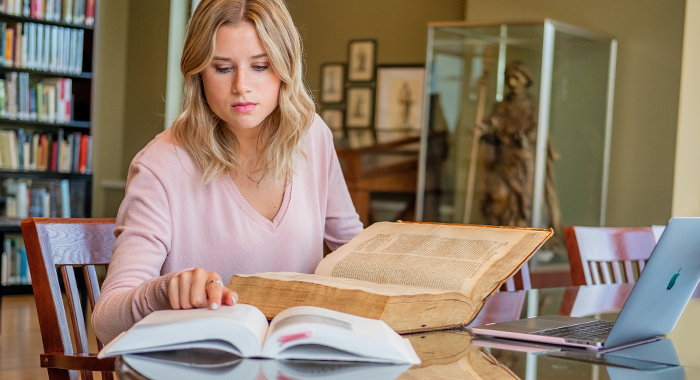Carpe Diem: Student Translates St. Norbert Sermon From Latin
“Super cool” might not be the first words that come to mind for some when they imagine translating a 12th-century sermon from Latin into English. But that’s exactly how Elle Maricque ’20 described her Undergraduate Research Forum project – and the sermon she worked on was one attributed to St. Norbert himself.
As a senior biology major and aspiring physician, Maricque decided to study Latin because of its usefulness in the medical field. She found herself enchanted by the language.
“Latin is fundamental to our culture and society,” says Maricque’s mentor Michael Holstead (Classical Studies). “It’s literally all around us. Our dollar bill. ‘Harry Potter.’ Phrases like carpe diem, et cetera, bona fide, cum laude, per diem, de facto, pro bono, vice versa – all of these phrases that we accept as part of our English language are actually Latin.”
Last year, Holstead offered a challenge to Maricque’s upper-level Latin class: Translate a sermon that St. Norbert gave around 1117 from Latin into English – for the first time.
“Nobody was really interested but I thought it would be super cool, so I ended up tackling it all by myself,” says Maricque. “A lot of what St. Norbert said had never been heard before. It was crazy to me that nobody had heard some of the wise words he said.”
Maricque’s translation focused on a sermon included in “The Life of St. Norbert” (“La Vida de Santi Norberti”), which was published in the 12th century, a generation after Norbert’s death. “Elle compared the Latin texts of the Jean Le Paige version of the sermon with six other versions,” says Holstead. “I thought her translation was great. She did a fantastic job conveying the Latin to a nice, clear English that’s readable. I’m impressed by her work.”
Maricque says the project was fascinating, but far from easy. “For one Latin word, there can be 50 different English words it could translate to,” she says. “That’s where you get the creative aspect. You can kind of pick and choose based on context which word you think works.”
As a science student, Maricque was excited to explore a different type of research project. “Latin is evolution in words,” she says. “I was hoping this would make people see that I’m more than a science nerd. I like the beauties of life as well, and I think Latin is that. It’s discovery of what is known as a ‘dead language,’ and I think that’s super cool.”
Maricque’s presentation of the sermon translation at the Undergraduate Research Forum, an annual event presented by the St. Norbert Collaborative, earned her an invitation to speak at the 2019 Dean’s Club, where she built valuable connections with St. Norbert College trustees and supporters. Next in her sights is another translation project – this time for a book of charters from the cartulary of Prémontré in the 1200s that she hopes will be published in 2020 – with Holstead and Heather Wacha from the University of Wisconsin-Madison.
Maricque’s advice for incoming first-years: “I would tell them to step out of their boundaries. I didn’t know I could have passion for something so completely outside of my interest. Don’t be afraid to try something new. You might end up loving it, and it might open doors for you.”
In other words: Carpe diem, et cetera.
In his own words, translated
An excerpt of a sermon of St. Norbert, circa 1117, translated from Latin to English by Elle Maricque ’20:
Brothers, our Lord Jesus Christ, when he sent his Disciples to preach, among others this command he declared them, that in whatsoever house they enter, first say, “peace be to this house,” and if the son of peace be there, their peace should rest upon him. We, however having become their imitators, not by our merits, but by the superabundant grace of God alone, announce this peace to you, which is not to be scorned by an incredulous mind, for it can extend as far as peace eternally. Therefore it is not unknown, for what reason we have gathered; it is not up to us, as the pilgrim and traveler who passes by, but of the power and the will of God to perform; it is for us, however, to acquiesce to His will out of whole and devoted affection.
Oct. 22, 2019












